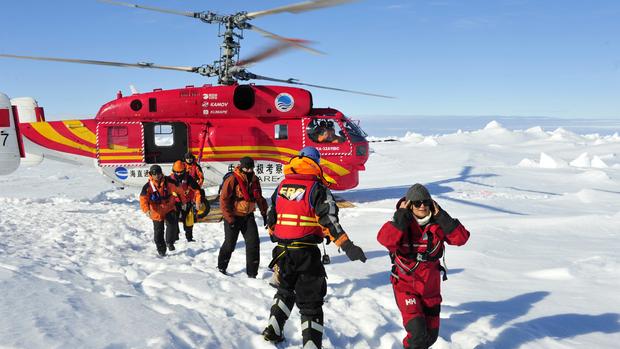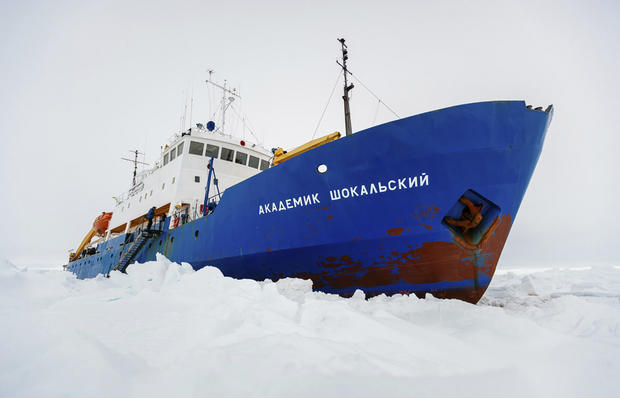Helicopter comes to rescue of ship passengers stuck for a week in Antarctic ice
CANBERRA, Australia -- A helicopter rescued all 52 passengers from a research ship that has been trapped in Antarctic ice since Christmas Eve after weather conditions finally cleared enough for the operation Thursday.
The Chinese helicopter carried the scientists and tourists from the Russian ship MV Akademik Shokalskiy in groups of 12 to an Australian icebreaker, said the Australian Maritime Safety Authority's Rescue Coordination Centre, which oversaw the rescue. The Aurora Australis will now take the passengers to the Australian island state of Tasmania, a journey expected to last two weeks.
"I think everyone is relieved and excited to be going on to the Australian icebreaker and then home," expedition leader Chris Turney told The Associated Press by satellite phone from the Antarctic.
The helipad was a home-made effort, stamped out in the show near the stranded ship.
First the chopper had to test the ice with a gentle experimental touch-down. Then when no cracks appeared, it settled down to load the first dozen passengers.
For more than a week, expedition members reassured worried families and friends via the Internet that they were staying positive on board their ice-bound ship, CBS News correspondent Holly Williams reports.
"Good things happening today; Judy's giving us hugs of the day, so everybody she meets in the corridors - big hugs," one of the stranded passengers said in a video dispatch.All 22 crew members stayed with the icebound vessel, which is not in danger of sinking and has weeks' worth of supplies on board. They will wait until the ice that surrounds the ship breaks up.
The eagerly anticipated rescue came after days of failed attempts to reach the vessel. Blinding snow, strong winds, fog and thick sea ice forced rescuers to turn back time and again.
On Thursday, it appeared the weather had thwarted yet another rescue attempt. The helicopter was originally going to airlift the passengers to the Chinese icebreaker on which it is based, with a barge then ferrying them to the Aurora. But sea ice prevented the barge from reaching the Snow Dragon icebreaker, and the maritime authority said the operation would have to be delayed.
A last-minute change in plans allowed the rescue to go ahead. The passengers were instead flown to an ice floe next to the Aurora and then taken by a small boat to the Australian ship, Turney said.
The Akademik Shokalskiy, which left New Zealand on Nov. 28, got stuck after a blizzard pushed the sea ice around the ship, freezing it in place about 1,700 miles south of Hobart, Tasmania. The scientific team on board had been recreating Australian explorer Douglas Mawson's 1911 to 1913 voyage to Antarctica.
"I'm a bit sad it's ended this way," he said. "But we got lots and lots of great science done."
China has an interest in Antarctica, with the growing scientific power recently beginning construction on its fourth Antarctic research base. Beijing was criticized for providing modest aid to the Philippines after Typhoon Haiyan in November, and was accused of letting politics influence its response.

